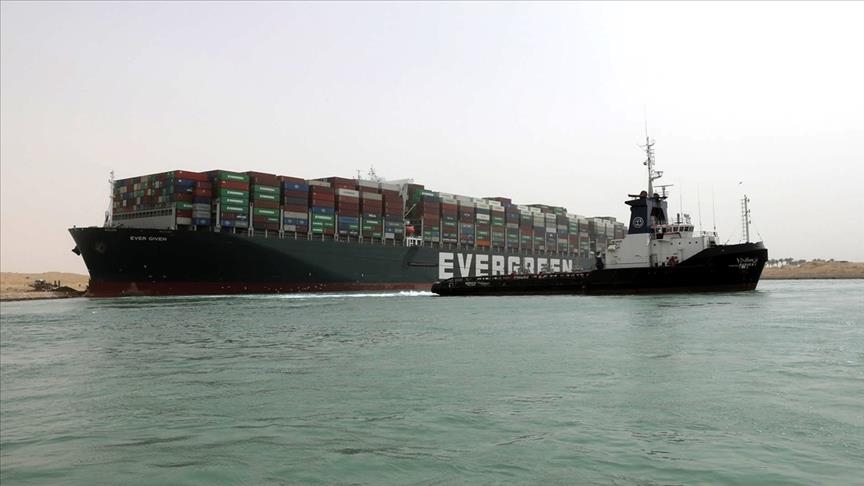ID :
593909
Fri, 03/26/2021 - 22:58
Auther :
Shortlink :
http://m.oananews.org//node/593909
The shortlink copeid
Suez crisis to trigger losses for Egypt, world trade

ISTANBUL
At least seven oil tankers have changed their routes due to blockage of the Suez Canal, one of the world's most important waterways, according to market research firm Kepler on Friday.
Ever Given, a large container ship ran aground, in the Egyptian canal on Tuesday after being caught in gusty winds and a stand storm.
Some 206 ships are stuck at the northern and southern entrances of the Suez.
Peter Bedrowski, the CEO of the Boskalis company, which is involved in the rescue operation, said unblocking the passage could take anywhere between "days to weeks."
This means shipping companies could face claims to the tune of millions of dollars with a possible rise in prices due to delays in delivering goods.
Oil and natural gas supplies disrupted
According to Bloomberg, 10% of the world's oil trade and 8% of the natural gas trade pass through the Suez, mainly from the Gulf region.
Among the 206 stuck ships, there are 10 huge oil tankers carrying 13 million barrels of oil, 13% of the world's daily crude oil supplies.
US and Russia are beneficiaries
International trade experts believe that the Suez Canal work disruption may be beneficial for Russia and the US.
For Russia, there will be an increase in gas demands from Europe to compensate the shortage resulted from the disruption of the flow of gas via the Suez Canal route.
While for the US, it may find the opportunity to increase its exports of both oil and gas to Europe via the Atlantic ocean.
Most important waterway
The Suez Canal is one of the most important waterways in the world which shortens the route between Europe and Asia. An estimated 12% of global trade passes through the canal.
Some 24% of the world's shipping containers and all shipping containers between Europe and Asia pass through the canal.
The Suez Canal Authority (SCA) said nearly 19,000 ships, or an average of 51.5 ships per day, passed through the canal in 2020.
Egypt may face foreign currency crisis
The Suez Canal is a major source of revenue for Egypt earning an average of $15 million every day.
The canal, however witnessed a decrease in its revenues in recent years. In 2019-20, its earnings were $5.6 billion, while in 2019/18 it earned $5.9 billion.
Egypt also fears that other oil and gas routes may take business away from the Suez. This includes the Israeli-Emirati planned oil pipeline that links the Gulf's oil to Israel's ports. Another gas pipeline links Israel, Greece and Greek Cypriot administration via the Mediterranean.
Egypt says these projects may cause losses to the canal revenues of 16% while experts suggest the losses may be bigger.
Reviewing the canal
Since its opening in 1869, the Suez Canal witnessed several expansions to meet growing demands.
The last expansion project was in 2015, where 35 kilometers (22 miles) of new channels were added to the canal to decrease waiting time for the ships.
However, after the incident of Ever Given, experts say Egypt is expected to review the canal's expansion projects.
Compensation over delays
The owner of the ship, the Japanese company Shoei Kisen KK, has apologized for the incident, yet, the company is expected to face claims in millions of dollars as many ships are forced to change their routes along with the delays in delivering the goods.
Still it is unclear how the Suez Canal Authority would charge the Japanese company and the company's insurance firm for the lost revenues from the incident or if it will take a part of the compensation in addition to the costs of the rescue operation.





